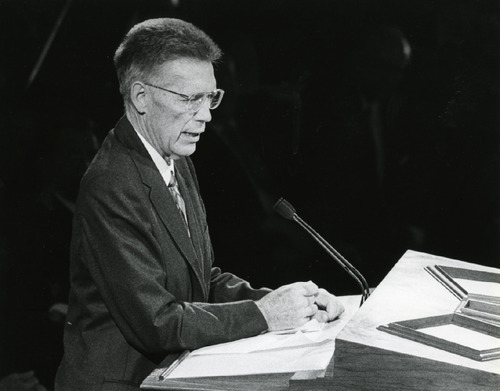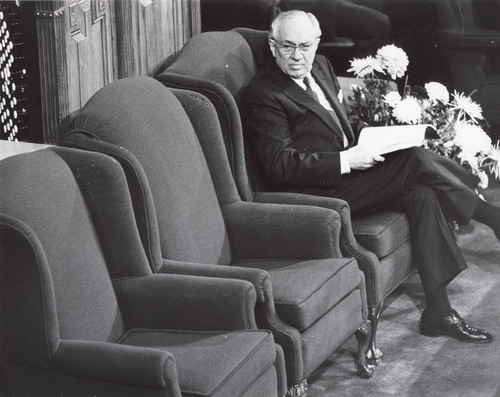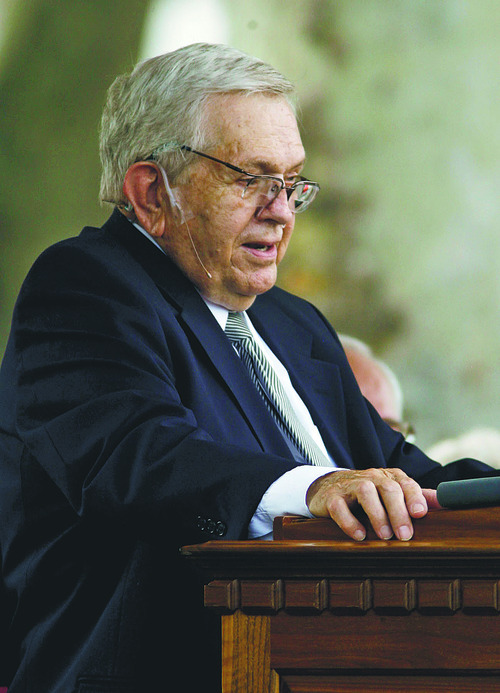This is an archived article that was published on sltrib.com in 2011, and information in the article may be outdated. It is provided only for personal research purposes and may not be reprinted.
President Thomas S. Monson, his two right-hand men and 12 apostles will take to the podium at next weekend's LDS General Conference and offer sermons that many Mormons will treat like faxes from God.
Members of The Church of Jesus Christ of Latter-day Saints consider these 15 men "prophets, seers and revelators" and look to them for divine guidance on issues as profound as the role of the Holy Spirit in their lives and as seemingly trivial as using "thee" and "thy" in prayers.
In the coming months, conference talks will be published in the church's official Ensign magazine, then read, revisited and replayed at countless Mormon services across the globe. They will be treated with admiration and reverence. And each time Monson enters a room, members will grow silent and stand as a gesture of unified deference.
Mormons don't use the term "infallibility" to refer to their leaders and readily acknowledge that they are imperfect men. In practice, though, LDS belief comes awfully close to that standard.
"We pay lip service to the prophet's fallibility," says Edward Kimball, son of late LDS President Spencer W. Kimball. "But when you come down to specifics, we can't think of any incidents where a prophet was wrong."
It's a conundrum for the ever-growing Utah-based church, born 181 years ago in upstate New York. Church founder Joseph Smith took the title "prophet" and claimed divine messages but also urged members to think for themselves and to ask God directly about the truth of various pronouncements.
One of Smith's most radical concepts was "continuing revelation," the notion that the scriptural canon did not end with the Bible and that well-established beliefs could be altered – even overturned – by new messages from heaven to the leaders in charge.
So much authority is ascribed to the LDS president, though, that quasi-prophet worship by the far-flung members of the 14 million-member faith seems unavoidable.
After all, Mormon children are taught to sing "Follow the Prophet" and are assured that he never will lead the church astray. At last October's General Conference, two LDS authorities mentioned in glowing terms a once-controversial speech by Ezra Taft Benson, who would become a church president, called "Fourteen Fundamentals in Following the Prophet."
Such dictates create tensions for faithful Mormons who opposed the church's support of California's Proposition 8 and for those who now object to the church's support of a compassionate approach to illegal immigrants.
How, then, should Mormons view their leaders? What happens when they slip? And when, if ever, is it OK to disagree with them?
Being a prophet • Smith knew his limitations and said a church president spoke for God only when he was "acting as a prophet." But few Mormons then or now could separate the man from the office. Instead, many have elevated his stature into an impossible realm.
Members say Smith was "just a normal man with failings and weaknesses who was called to do extraordinary things," says John Fowles, an LDS lawyer in London, "but then many are very uncomfortable with even the very mild report of some of his weaknesses and failings."
Their faith is sometimes shaken, Fowles says, and it's all because of "unrealistic and unnecessary expectations."
For their part, Mormon leaders know they are fallible.
"Forget everything I have said, or what … Brigham Young … or whomsoever has said … that is contrary to the present revelation," the late apostle Bruce R. McConkie once preached. "We spoke with a limited understanding."
And when asked about his statement discounting that man would ever reach the moon, former LDS President Joseph Fielding Smith said, simply, "Well, I was wrong."
Disillusionment with LDS leaders "would evaporate," says Philip Barlow, Arrington Chair of Mormon History and Culture at Utah State University, "if people saw the church not as essentially divine, marred only by the weaknesses of human administrators, but rather … [as made up] entirely of human beings — with all of their limitations—who are trying to respond to the divine with which they have (in faith) been touched."
Biblical precedents • Reading the Bible should give Mormons a clue as to the imperfections of prophets.
Moses killed a man and later met God face-to-face. Jonah fled from God and then complained — even after the Ninevites repented. David committed adultery and then murder. In Mormonism, LDS prophet Brigham Young expressed racism and Gordon B. Hinckley fell prey to a forger.
"I'm grateful to know this and more," says Molly Bennion, a Mormon in Seattle. "Their very fallibility gives me hope that I can overcome and that God might forgive me."
Bennion says those who follow the LDS prophet unthinkingly, believing there is no need to weigh their leader's words, "never develop the spiritual strength necessary to weather the inevitable disillusionment in some leader or, perhaps worse, in oneself."
All humans learn as least as much from their mistakes as from their triumphs, Bennion says. "To deny our leaders that possibility seems unfair."
No doubt, most LDS leaders would agree.
"Adulation is a disease I fight every day," Hinckley, who died in 2008, told The Salt Lake Tribune a decade earlier.
Hinckley knew all too well the spiritual dangers of hero worship for himself and the people he led.
People need heroes • The near-deification of LDS leaders seems to have escalated in the post-World War II era, says religious historian and writer Jana Riess, corresponding with the rise in America's "celebrity culture."
This occurred at precisely the same time, says Riess, a Mormon in Cincinnati, that most Latter-day Saints would "no longer have personal connections with their leaders and those leaders' families."
Kristine Haglund, editor of Dialogue: A Journal of Mormon Thought in Boston, agrees.
"Culturally, I think Americans are primed to crave impressive leaders and to be terrified that they might have flaws," Haglund says. "Righteous celebrities are just what we need, so we turn general authorities into stars."
Dieter Uchtdorf, Monson's second counselor, becomes Mormonism's Michael Jordan, she says, "only better."
Mormons, like other Americans, "are desperate for advice, news, opinion, anything that is guaranteed in some way," Haglund says, "in a time when authoritative sources of information are nonexistent."
The apostles' views, offered in modern English and often accompanied by simple mandates such as shunning tattoos or avoiding pornography, "are deeply appealing," Haglund says, as Mormons struggle to know how to be disciples of Christ.
But are their words really scripture?
Lessons from on high • Turning LDS authorities' speeches into scripture would betray the church's canonization process, says Fowles, the London lawyer.
That process exists for a reason, he says. The leaders probably would prefer their thoughts be "received as deeply pondered and inspired counsel sincerely delivered as such."
The ultimate test of any Mormon pronouncement is "the ratification of the Holy Spirit," says Mormon sociologist Armand Mauss, of Irvine, Calif., "which places a heavy burden on the hearers as well as the speakers in General Conference."
The speeches mostly emphasize long-standing doctrines and LDS standards already spelled out in official publications, Mauss says. They largely serve to "build and maintain a sense of community among the Latter-day Saints in a diverse world."
That makes it tough, Fowles says, to disagree with one of them.
"The [Mormon] culture has developed internally in such a way," he says, "that raising thoughtful counterpoints to a given address by a general authority (as would be natural in almost any other venue in response to a talk or presentation) would be nearly universally received by fellow Latter-day Saints as subversive or even apostate."
Riess experienced that perspective firsthand last October, when she wrote a post on her blog, Flunking Sainthood, taking issue with LDS senior apostle Boyd K. Packer's conference comments about homosexuality.
Some blog commenters were "calling for my head for publicly disagreeing with a general authority," Riess says. "But what is wrong with disagreement and debate? I did not say anything hurtful about President Packer; I did not attack him personally. Nor did I question that he is called to hold the position of authority that he does. I simply disagreed with him. Why is that so threatening?"
In the end, Packer softened parts of his speech when it was published online and in the Ensign.
There have been times, such as during the early 20th-century debate about the League of Nations, when LDS apostles publicly disagreed with one another.
Ultimately, LDS observers say, Mormons have to decide for themselves how much deference to give the words of their leaders and deal with the consequences of their choices.
It is easy for Barlow, a Mormon, to appreciate the intentions and example of LDS leaders, without falling prey to adoration.
"The wonder is not that some or another leader has disappointed in word or action," he says. "The proper wonder is that, with all the foibles to which we humans are subject, church leaders may by their words and deeds exhibit the truth of what Jesus spoke of: grains of salt and bits of leaven capable of enlivening a whole people with the taste of the transcendent."







